
Encik Ahmad Bin Ibrahim
Pusat Bahasa Moden & Sains Kemanusiaan,
Universiti Malaysia PAHANG
Assalamualaikum w.b.t..,
Terlebih dahulu saya selaku Ketua kumpulan Lantai-debu ingin merakamkan setinggi-tinggi ucapan terima kasih yang tidak terhingga kepada Encik Ahmad Bin Ibrahim selaku Pensyarah bagi subjek Hubungan Etnik bagi Semester 1 2010/2011. Pelbagai aktiviti telah dilakukan dan diterjemahkan oleh En. Ahmad Bin Ibrahim bagi memupuk satu kumpulan sasar terutamanya kepada pelajar-pelajar untuk menanamkan sifat-sifat rasa tanggungjawab terhadap negara. Sememangnya bila disebut subjek Hubungan Etnik, ramai menganggap ianya subjek yang biasa, tetapi adakah anda faham disebalik pengertian Hubungan Etnik itu sendiri?. Mungkin selama ini anda terlepas pandang pelbagai sejarah-sejarah lampau yang telah membentukkan negara Malaysia yang harmoni ini. Dalam konteks pembelajaran Hubungan Etnik, pelbagai maklumat-maklumat baru kita dapat ketahui dan dapat dibincangkan sepanjang mengikuti kelas tersebut. Walaupun pelbagai aktiviti yang dirancang dianggap suatu aktiviti biasa, tetapi ianya mampu membawa mesej-mesej yang tertentu. Seingat saya, tiada subjek yang ditawarkan oleh Universiti yang mempunyai pelbagai aktiviti sebegini khasnya dalam menjurus pemahaman yang lebih berfokuskan kepada hubungan etnik di negara ini. Sekalung Tahniah saya ucapkan kepada Encik Ahmad Bin Ibrahim kerana telah membimbing semua generasi pelajar ke arah matlamat mewujudkan sifat-sifat yang positif antaranya memastikan kehadiran yang lebih awal dalam proses pembelajaran di dalam kelas. Mungkin selama ini ada segelintir pelajar yang pernah datang lewat, tetapi dari pemerhatian saya, ada yang telah melakukan sedikit perubahan dari sebelumnya. Terima kasih atas perubahan sikap yang telah ditunjukkan.
Akhir kata, saya serta warga kumpulan Lantai-debu ingin memohon maaf andai kata kami telah melakukan kesilapan sepanjang proses pembelajaran Hubungan Etnik dan segala aktiviti yang dianjurkan, kami sekumpulan telah berusaha memberikan satu komitmen yang terbaik.Mohon berkat dan doa Encik Ahmad agar segala soalan peperiksaan akhir dipermudahkan bagi kami semua iaitu dengan harapan segala target kami semua untuk mendapatkan "A" termakbul.InsyaAllah..amin..
wassalam.,
(Nik Mohd Farid Bin Nik Ibrahim)
Ketua Kumpulan Lantai-debu




































